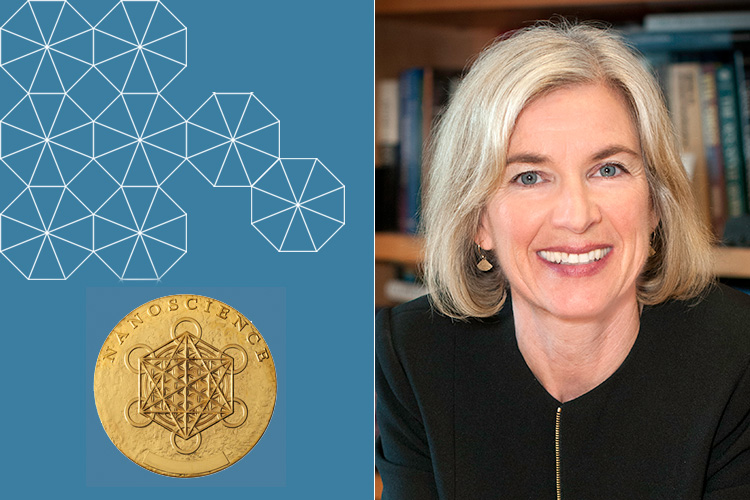Jennifer Doudna shares 2018 Kavli Prize in Nanoscience
Doudna and her colleague Emmanuelle Charpentier, who together invented the CRISPR-Cas9 gene editing tool, shared the prize with Lithuanian biologist Virginijus Šikšnys, who simultaneously discovered how the enzyme works

May 31, 2018

Emmanuelle Charpentier, Jennifer Doudna and Virginijus Šikšnys, recipients of the 2018 Kavli Prize in Nanoscience.
The Kavli Prize in Nanoscience, given every other year by the Norwegian Academy of Science and Letters and the Kavli Foundaion, was awarded this year to Jennifer Doudna and two colleagues who developed the powerful nanoscale tool CRISPR-Cas9 to edit DNA.
The $1 million award, announced May 31, will be shared by Doudna, a professor of molecular and cell biology and of chemistry at the University of California, Berkeley, Emmanuelle Charpentier of the Max Planck Society and Virginijus Šikšnys of the Institute of Applied Enzymology in Vilnius, Lithuania. Doudna is also a Howard Hughes Medical Institute investigator.
“CRISPR-Cas9 is a breakthrough nanotool that will considerably enhance our understanding of genetic mechanisms. This great invention confers to society enormous capabilities for positive innovations,” said Arne Brataas, head of the nanoscience prize committee, in a statement.
The prize was announced along with two other million-dollar Kavli Prizes: in astrophysics to Ewine van Dishoeck of the Netherlands, and in neuroscience, shared by James Hudspeth of Rockefeller University in New York, Robert Fettiplace of the United Kingdom and Christine Petit of France.
“This prize recognizes the profound value of curiosity-driven research, and represents the contributions of our lab members. It’s an honor to share The Kavli Prize with my colleagues,” Doudna said.
Inventing a scalpel for the code of life
Doudna and Charpentier together published a landmark paper in June 2012 describing how they had reengineered an enzyme used by bacteria to make it precisely cut DNA in all types of cells. Within six months of that publication, six groups around the world, includng Doudna’s, proved it worked in a variety of cell types, including human cells.

Schematic representation of the CRISPR-Cas9 system. The Cas9 enzyme (orange) cuts the DNA (blue) in the location selected by the RNA (red). Image courtesy of Carlos Clarivan/Science Photo Library/NTB Scanpix
Around the same time, Šikšnys also discovered how CRISPR-Cas9 worked in bacterial cells and could be used to cleave other types of DNA, though without a key part of Doudna and Charpentier’s discovery: that the Cas9 enzyme requires two separate RNA molecules in bacteria that could be streamlined into a single guide RNA for use as a genome editing technology.
According to the Kavli announcement, “The pioneering work has unleashed global interest among scientists and the public in a field of research with enormous potential to address disease-causing mutations in humans and improve agriculture. It has also sparked a conversation around the ethical challenges that must be addressed when altering genes.”
“These laureates represent truly pioneering science, the kind of science which will benefit humanity in a profound way. They will inspire both current and future generations to continue searching for answers to some of the most difficult questions of our time. Through their hard work, dedication and innovation, they have strengthened our understanding of existence,” said Ole M. Sejersted, president of the Norwegian Academy of Science and Letters.
Each prize consists of a gold medal and a cash award of $1 million to be shared by the cowinners. The 2018 Kavli Prizes will be awarded on Tuesday, Sept. 4, in Oslo, Norway.
The Norwegian Academy of Science and Letters selected the laureates based on nominations by committees whose members are recommended by six of the world’s most renowned science societies and academies. The Kavli Prize is a partnership between the Norwegian Academy of Science and Letters, the Kavli Foundation and the Norwegian Ministry of Education and Research. First awarded in 2008, the Kavli Prize has honored 47 scientists from 11 countries.
UK award
Doudna accepted another award this week, the Croonian Medal of the Royal Society in London, “for her outstanding structural and functional studies of RNA and ribonucleoproteins and for elucidating the molecular mechanism of the CRISPR-Cas9 system and developing it for genetic engineering.” Upon accepting the honor on Wednesday, May 30, she delivered the Croonian Medal Prize Lecture 2018, the Royal Society’s premier lecture in the biological sciences. Doudna is a foreign member of the society.
RELATED INFORMATION